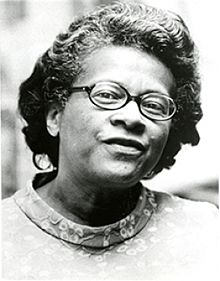Letitia Woods Brown, historian, academician, public scholar and community activist was born on October 24, 1915, in Tuskegee, Alabama. She was the middle child of Tuskegee Institute instructors Matthew and Evadne Woods. In 1935, Letitia Woods completed a Bachelor of Science at Tuskegee. After a brief stint as a teacher in Macon County, where the dreadful conditions of the rural black school greatly impacted her, she entered Ohio State University, completing a Master of Arts in history in 1937.
While at Ohio State, Woods participated in sit-ins against whites-only restaurants organized by the NAACP Youth Council. She also faced racism on a personal level when her academic counselor at Ohio State questioned whether she as a black woman had the intellectual capacity to complete a graduate degree. In 1938, a year after her graduation, Woods visited Haiti to study Caribbean history and literature with a group from Ohio State. She added that she took the trip to fulfill a desire to “get outside of the United States to breathe free air.”
In 1945, Woods began work on her Ph.D. in history at Harvard University, where she met Theodore E. Brown, an economics Ph.D. student from Harlem, New York; they married in 1947. Letitia Woods Brown completed her Ph.D. in 1966, becoming the first black woman to earn a Ph.D. in history at Harvard.
Letitia Woods Brown’s distinguished career as a college educator started in the late 1930s when she became a history instructor at Tuskegee and then at LeMoyne-Owen College in Memphis, Tennessee from 1940 to 1945. After moving from New York to Washington, D.C., she taught at Howard University in the late 1960s. In 1968, she went to Australia as a senior Fulbright lecturer for two of the country’s most prestigious universities, Monash and Australia National University.
Letitia Woods Brown’s Ph.D. dissertation was published by Oxford University Press in 1972, under the title Free Negroes in the District of Columbia, 1790–1846 and was a pioneering study of the urban history of African Americans in the nation’s capital. A meticulous work of research, Free Negroes unearthed the impressive volume of litigation initiated by slaves to establish their claims to freedom in the District of Columbia.
From 1971 until her passing in 1976 in Washington D.C. at the age of 60, Dr. Woods Brown was a professor of history and American civilization at George Washington University. While there, she was the only full-time Black faculty member. During this same time period, Woods Brown was a decisive force in the preservation of sites associated with African American history as a member of the Committee on Landmarks of the National Capital.
In 1983, the Association of Black Women Historians (ABWH), renamed their annual top book award the Letitia Woods Brown Memorial Book Prize. Her trajectory was also honored by The Historical Society of Washington, D.C. and George Washington University with The Letitia Woods Brown Lecture and The Letitia Woods Brown Fellowship in African American History and Culture, respectively.

